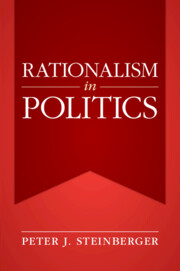20 results
8 - Territoriality from the Sea
- from Part II - New Geographies of Borders: Territory, Land, and Water
-
-
- Book:
- Lawless Zones, Rightless Subjects
- Published online:
- 02 January 2025
- Print publication:
- 09 January 2025, pp 141-157
-
- Chapter
-
- You have access
- Open access
- HTML
- Export citation

The Dialectical Agroecologist
-
- Published online:
- 31 October 2024
- Print publication:
- 14 November 2024
The active, the sympathetic, and the reluctant: political action and eco-social attitudes among Swedish residents
-
- Journal:
- European Political Science Review , First View
- Published online by Cambridge University Press:
- 30 September 2024, pp. 1-17
-
- Article
-
- You have access
- Open access
- HTML
- Export citation
2 - Political Action and Valuable Institutions
- from Part I - Political Community
-
- Book:
- Statehood as Political Community
- Published online:
- 15 February 2024
- Print publication:
- 22 February 2024, pp 48-69
-
- Chapter
- Export citation
Walled in: borderlands, frontiers and the future of archaeology
-
- Article
-
- You have access
- Open access
- HTML
- Export citation
27 - Prosociality and Civic Engagement
- from Part IV - Applications
-
-
- Book:
- The Cambridge Handbook of Prosociality
- Published online:
- 25 May 2023
- Print publication:
- 08 June 2023, pp 542-559
-
- Chapter
- Export citation
1 - Majoritarian Politics and Minority Interests
- from Part I - Frustrated Majorities, Issue Intensity, and Political Action
-
- Book:
- Frustrated Majorities
- Published online:
- 15 September 2022
- Print publication:
- 22 September 2022, pp 3-19
-
- Chapter
- Export citation
5 - Model Extensions: Varying Size of the Minority, the Free-Rider Problem, and Social Welfare
- from Part II - Argument: an Intensity Theory of Electoral Competition
-
- Book:
- Frustrated Majorities
- Published online:
- 15 September 2022
- Print publication:
- 22 September 2022, pp 85-96
-
- Chapter
- Export citation
4 - Theory and Model Results: Issue Intensity, Costly Action, and Minority Representation
- from Part II - Argument: an Intensity Theory of Electoral Competition
-
- Book:
- Frustrated Majorities
- Published online:
- 15 September 2022
- Print publication:
- 22 September 2022, pp 68-84
-
- Chapter
- Export citation
6 - Introduction to Empirical Evidence
- from Part III - Evidence: Empirical Patterns and Intensity Theory
-
- Book:
- Frustrated Majorities
- Published online:
- 15 September 2022
- Print publication:
- 22 September 2022, pp 99-103
-
- Chapter
- Export citation
2 - The Political Science of Representation, Elections, and Intensity
- from Part I - Frustrated Majorities, Issue Intensity, and Political Action
-
- Book:
- Frustrated Majorities
- Published online:
- 15 September 2022
- Print publication:
- 22 September 2022, pp 20-44
-
- Chapter
- Export citation
9 - Opening Avenues of Costly Action: Institutional Change to Costs of Campaign Contributions
- from Part III - Evidence: Empirical Patterns and Intensity Theory
-
- Book:
- Frustrated Majorities
- Published online:
- 15 September 2022
- Print publication:
- 22 September 2022, pp 131-145
-
- Chapter
- Export citation
11 - Conclusion: Implications for Representative Democracy and the Study of Politics
- from Part IV - Conclusions
-
- Book:
- Frustrated Majorities
- Published online:
- 15 September 2022
- Print publication:
- 22 September 2022, pp 165-176
-
- Chapter
- Export citation
3 - Sketching a Theory of Intensity and Electoral Competition
- from Part II - Argument: an Intensity Theory of Electoral Competition
-
- Book:
- Frustrated Majorities
- Published online:
- 15 September 2022
- Print publication:
- 22 September 2022, pp 47-67
-
- Chapter
- Export citation
7 - Politicians Side with Intense Minorities
- from Part III - Evidence: Empirical Patterns and Intensity Theory
-
- Book:
- Frustrated Majorities
- Published online:
- 15 September 2022
- Print publication:
- 22 September 2022, pp 104-117
-
- Chapter
- Export citation
10 - Closing Avenues of Costly Action: Reform to Primary Elections
- from Part III - Evidence: Empirical Patterns and Intensity Theory
-
- Book:
- Frustrated Majorities
- Published online:
- 15 September 2022
- Print publication:
- 22 September 2022, pp 146-162
-
- Chapter
- Export citation

Frustrated Majorities
- How Issue Intensity Enables Smaller Groups of Voters to Get What They Want
-
- Published online:
- 15 September 2022
- Print publication:
- 22 September 2022

Rationalism in Politics
-
- Published online:
- 11 August 2022
- Print publication:
- 25 August 2022
7 - The Psychology of Public Opinion
- from Part I - Foundations of Political Psychology
-
-
- Book:
- The Cambridge Handbook of Political Psychology
- Published online:
- 17 February 2022
- Print publication:
- 24 February 2022, pp 104-117
-
- Chapter
- Export citation
Cacophony of Contestation: Forms of Voice and the Warsaw Taxi Market as a Field of Struggles
-
- Journal:
- European Journal of Sociology / Archives Européennes de Sociologie / Volume 57 / Issue 2 / August 2016
- Published online by Cambridge University Press:
- 26 September 2016, pp. 259-295
-
- Article
- Export citation

